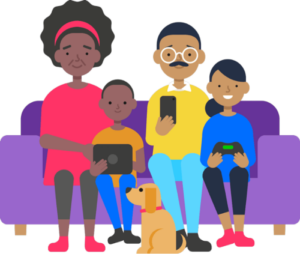It’s important to reflect on what we do online and how taking control of our experiences makes us feel. Our report, Intentional use: How agency supports young people’s wellbeing in a digital world, explores this through the example of managing screen time.
An overview
It is important to protect young people from the risks of being online. However, our wellbeing programme of work has revealed that it is just as crucial to support young people’s access to the benefits of digital technologies. As the significance of the digital world in our lives grows, we must ensure that young people don’t just ‘get by’ online but thrive.
To develop well in a digital world, young people need to be supported to self-regulate (manage their feelings and behaviour). They also need to have the agency (control over their lives) to take steps where they see room for improvement.
In the example of screen time, supporting young people’s wellbeing through agency is not just about counting the time spent online. More important is using tools and insight to reflect on what they are doing with that time and how it is making them feel.
Key insights
Through research conducted with TikTok, we spoke to teens and parents from five countries (UK, Ireland, France, Germany and Italy) to better understand their views on feeling in control, how they manage screen time and how this impacted their daily lives.
We learned that:
- Agency plays a direct role in teens’ wellbeing and is something they actively seek.
- It was common for teens to feel they lacked agency in their online activities.
- Teens generally accepted they needed help to exercise control over their screen time.
- Most wanted to take responsibility for their screen time themselves but weren’t always aware of the tools and support available to help them.
Teens and parents told us they wanted:
- Access to more data about their usage.
- Support which adapts to their circumstances (e.g. school holidays versus term time).
Recommendations
All of us have a part to play in supporting the empowerment of young people and families to feel control online. The report details our recommendations, which are summarised here:
- Governments can champion wellbeing and agency as well as risk reduction and safety.
- Industry can support safety and agency through design.
- Parents and carers can use available resources, including those featured in the report, to support young people’s engagement with technology in a managed way.
The report features “7 Questions for Reflecting on Digital Habits” to help families’ mindfulness about what they are doing, why they are doing it, what they are happy with and what they want to change. It also includes some of Internet Matters’ dedicated resources to help parents and carers help their children benefit safely from connected technology.
Simone Vibert, Head of Policy at Internet Matters, said: “We are grateful to the young people and parents who shared their thoughts with us through this recent research. We know that agency, the ability to take steps to manage feelings and actions online, plays an important role in children’s wellbeing. In addition, young people have been clear in telling us they would welcome support in managing their online lives. It is now up to government, industry and the trusted adults around them to ensure we provide young people with this support.”





